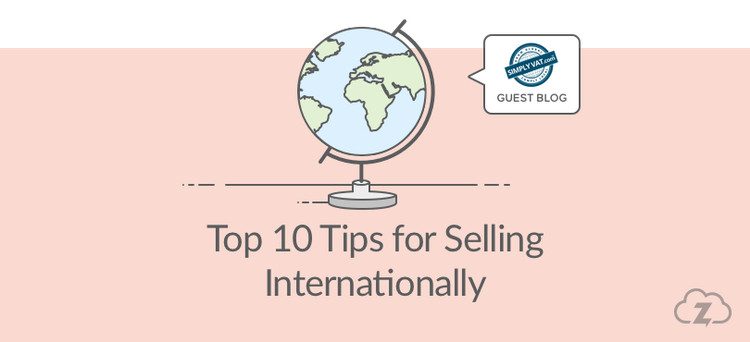SimplyVAT.com’s top 10 VAT tips for international sales

This guest blog is contributed by SimplyVAT.com, a Zenstores partner providing international VAT compliance services to help grow your business.
Its 20 years since the first recorded online transaction — A sting CD bought for $12 on NetMarket (remember them?!). How much has changed – with global sales reached £14 trillion at the end of 2015!
With the advent of the marketplaces there is now a huge opportunity for online retailers to increase their profits considerably by tapping into the overseas markets.
Selling via the marketplaces gives the seller many, if not, all the tools needed for international success without the hefty cost of investing in infrastructure - from localized exposure, in-country warehousing, packing and labelling and delivery to the customer’s door. The one thing the marketplaces don’t do is sort out the VAT compliance for the seller in the local markets.
There are rules and regulations which cannot be ignored – worst case scenario – the tax authorities can levy fines and penalties for undeclared VAT which could put you out of business. Preparation and planning are the key to a successful international business.
Below is our list of 10 essential VAT tips:
- Do Your Homework
It’s the boring stuff, but make sure VAT compliance is one of the first things to research on your list. Planning ahead can be the difference between the success and failure of your business.
- Don’t Think of Yourself as a Business? Think Again!
You may think you are exempt from VAT regulations as an individual selling through the market places such as Amazon or Ebay – you are not! You have the same obligations as a registered business selling to consumers. The tax authorities are known to trawl through such marketplaces looking for, and finding, potential violators
- The EU VAT Distance Selling Rules
If you are based in the UK and deliver to both local and mainland EU customers, you are governed by the ‘EU VAT distance selling rules’. You charge local VAT until your sales hit set thresholds in each EU country – Euros 35,000 in most EU countries, except Germany, Netherlands and Luxembourg where it is Euros 100,000. Once you hit the threshold you will need to VAT register in that country.
Even if you are not VAT registered in the UK, you may still need to register in other EU countries if your sales exceed the set thresholds.
- Know The Different VAT Rates
Every EU country has a standard and reduced VAT rate, and also in the UK and Ireland, we have a zero-rate. Standard VAT rates range from 17 – 27% and reduced rates are applied to more essential items such as foodstuffs and safety equipment. If you are selling a zero-rated item in the UK, it will not be zero-rated anywhere else in the EU (except possibly Ireland). Once you become VAT registered in another EU country make sure you know the local VAT rate you need to apply.
- Keep Your Margins Healthy
When working out your pricing, make sure you still have enough in your margin once you have to account for local VAT. Research the local market and make sure you can stay competitive.
- Monitor your Sales
Know when you are about to exceed a threshold. Late or non-compliance will result in penalties or fines from the EU tax authorities.
- Invoice Compliance
In some countries the provision of an invoice is compulsory. Each country has different criteria for what information should be presented on an invoice. Are you applying the right VAT rate and is the correct information on the invoice?
- VAT Returns
Once registered, you will have to submit VAT returns to the tax authority, at the frequency and on the deadline specific to that country.
- Additional Compliance Reporting
EC Sales Lists and Intrastat declarations are a way for European governments to collect statistical information about the movement of goods between the EU countries. Failure to provide the information once you are liable (thresholds are reached) can lead to fines.
- Don’t Be Put Off
There are experts to help for every part of the process from website localisation to labelling to logistics to help with your international VAT compliance needs.
The opportunities and profit which follows usually far outweigh any additional costs involved in reaching your global audience.
Do not hesitate to get in touch at http://www.simplyvat.com/. Here at SimplyVAT.com we like to help you sleep at night.
All that’s left is to wish you every success with your international expansion plans!

